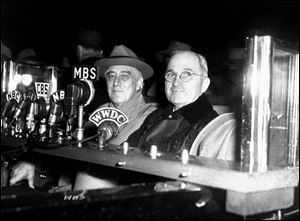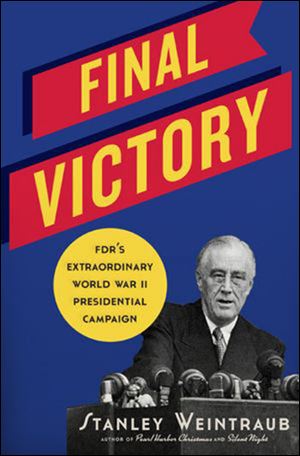
‘Final Victory’ recounts FDR’s last election
7/22/2012
Final Victory, by Stanley Weintaub. (Da Capo Press; 336 pages; $26).

President Franklin D. Roosevelt and Vice Presidential running mate Harry S. Truman on the campaign trail for Roosevelt’s unprecedented fourth term in 1944.
Looking back, it seemed inevitable: Of course Franklin D. Roosevelt was elected to a fourth term as president in 1944. He was popular, we were at war -- how could it have been any different?
In Final Victory, a briskly written history of the presidential election of 1944, historian Stanley Weintraub shows that, while the destination may never have been in serious doubt, the road to it was filled with some obstacles that time's passing -- and the secrecy of the day -- have kept mostly hidden.
The biggest of those obstacles was Roosevelt's health, which so alarmed his inner circle that in early 1944 a Navy heart specialist was brought in to find ways to keep him alive. The president's clothes seemed several sizes too big; his few public appearances before the nominating conventions -- gaunt, shaky, voice softer than normal -- left some supporters frightened. By contrast, his Republican opponent, Thomas Dewey, was youthful and healthy (if a bit dull).
Even if Roosevelt had been healthy, running for an unprecedented fourth term -- even during wartime -- was another touchy subject. Running for a third term had already violated an unwritten tradition of two terms in the White House; some critics thought giving Roosevelt a fourth term would be tantamount to voting for a dictatorship.
And then there was his vice president. Roosevelt's No. 2 for his second and third terms had been Henry Wallace, a left-leaning progressive who scared the bejesus out of conservatives and anti-Communists of both parties. Roosevelt quietly agreed that Wallace had to go, but finding a replacement was easier said than done in a political party dominated by one man for so long. The list of contenders was filled with political unknowns (Supreme Court Justice William Douglas) and political dinosaurs (southern segregationist James Byrnes). The least objectionable choice was a senator from Missouri named Harry Truman, who had a record of integrity and fiscal responsibility in Washington but also his own share of baggage (past connections to the Klan and political bosses).

Final Victory, by Stanley Weintaub. (Da Capo Press; 336 pages; $26).
Weintraub -- whose recent book subjects include the Christmas Truce of 1914 and Christmas in Washington after Pearl Harbor -- does a great job turning what could be a predictable subject (we know how it turns out, after all) into a page-turner.
And he shows some interesting same-as-it-ever-was parallels to today.
Tapping anxiety over Roosevelt's left-wing and labor allies, groups supporting the Republican Party greatly outspent the Democrats by raising record amounts of donations (Roosevelt, to his amusement, got a solicitation himself). Conservatives in Congress, fearful of what they saw as the possibility of voter fraud among soldiers sworn to serve the president, tried to make it harder for military personnel to get their votes cast.
Weintraub works to make his larger-than-life characters -- Roosevelt, Truman, Dewey, Winston Churchill, Eleanor Roosevelt, Joseph Kennedy, many others -- into real people, and he succeeds; you can almost see the miniseries being cast in your mind as you read.
But he doesn't cut corners in his race to Election Day, using present-day reportage and some long-squirreled-away memoirs to show that however inevitable Roosevelt's victory was, its story has more drama than the history books suggest.